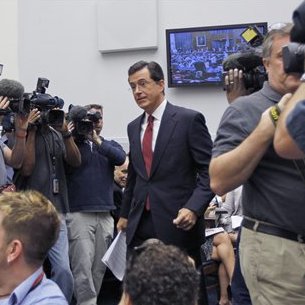When it comes to the use of words, people (and dictionaries) generally fall into two camps: They use words the way they were intended to be used; or they say what they please, and as long as you understand them, it doesn’t matter.
In linguistic terms, those camps are “prescriptivist” and “descriptivist.” In shorthand, a “prescriptivist” follows the way grammar and language should be used or traditionally has been used; a “descriptivist” follows the way grammar and language is used, “the rules” be damned.
Here’s one example of how words can divide: Stephen Colbert coined the term “truthiness” in the first episode of The Colbert Report in 2005, to mean “the quality of seeming to be true according to one’s intuition, opinion, or perception without regard to logic, factual evidence, or the like” (though, of course, Colbert did not use that definition). “Truthiness” was named the American Dialect Society’s “Word of the Year” for 2005.
By 2010, “truthiness” had made it into several “real” dictionaries, including New Oxford American Dictionary, Random House Unabridged, and Collins English Dictionary, though only the British English version of the latter, not the American English one. It’s not in the stately Oxford English Dictionary, except as its original, 1824 definition: “truthfulness, faithfulness.”
“Truthiness” was Merriam-Webster’s “Word of the Year” for 2006, but it’s not yet in the “adult” M-W dictionaries, Collegiate and Unabridged. “Truthiness” exists in Merriam-Webster only in its “Open Source” project, where users can submit words they think should be in the “adult” dictionary.
If you are a “prescriptivist,” then, you cannot use “truthiness” if you rely on a specific dictionary to tell you what words are “real” and that dictionary does not include “truthiness.”
In real life, we are all “descriptivist” to some extent, since we rarely are perfect in our grammar, syntax, and word usage. And the more we use language in “descriptivist” ways, the quicker those ways can become acceptable enough that even “prescriptivists” can use them.
To illustrate this another way, the American Heritage Dictionary published its fifth edition in 2011. Thanks to the internet, the dictionary is updated more regularly than when print alone was involved, as are several other dictionaries with online presence. As American Heritage says, “When enough people use the same word in the same new way, and when this use continues over a prolonged period of time, dictionary editors take notice” and add the new words. “Descriptivist” becomes closer to being “prescriptivist.” (Full disclosure: This columnist is a new member of American Heritage’s Usage Panel.)
That acceptance philosophy applies to new uses of a word as well as new words. Some “prescriptivists” abhor the verbification of words, and still insist “contact,” for example, cannot be a verb meaning “communicate with,” though those ramparts fell in most dictionaries long ago.
American Heritage has applied new parts of speech to many words since the first publication of the fifth edition. They include words like “halter” and “artisan,” now acceptable as adjectives as well as nouns, and “comp” and “julienne,” acceptable as verbs as well as nouns. “Julienne” is also acceptable as an adjective, but not so with “comp” in American Heritage. That’s why “descriptivists” may have more fun: If you’re a “prescriptivist,” you cannot take a “comp” lesson in how to “julienne” vegetables, though someone can “comp” you the lesson.
However you slice it, language is confusing, and sometimes a matter of taste.
Merrill Perlman managed copy desks across the newsroom at the New York Times, where she worked for twenty-five years. Follow her on Twitter at @meperl.

